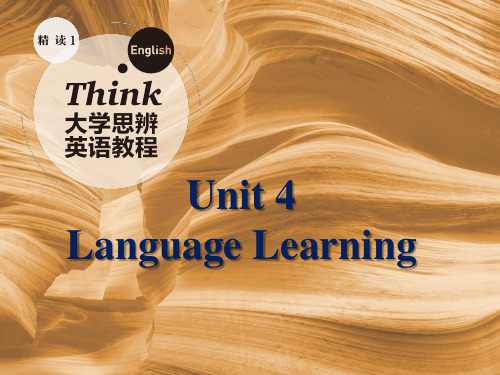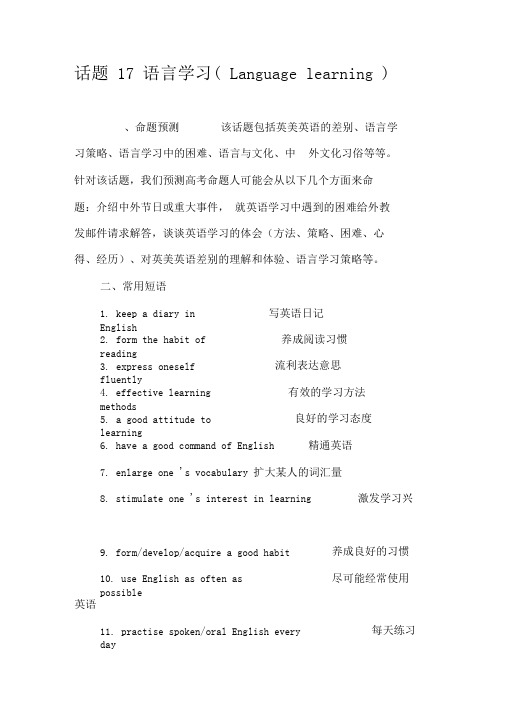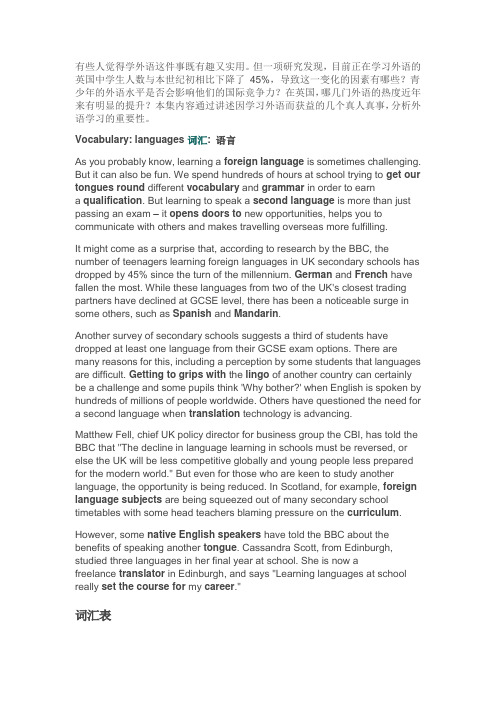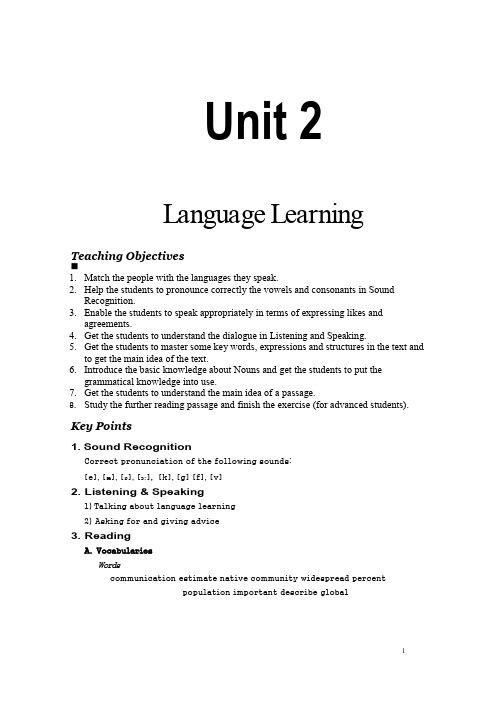language learning
大学思辨英语教程 精读1课件Unit 4 Language Learning

• Understand the effects of cultural differences on communication and language learning
Critical Thinking
Reading Skills
Learning Objectives
• Reading Skills
• Summarize the main idea of each paragraph • Identify topic sentences and key words • Identify supporting details
• At various times her house and yard have been filled with dogs, cats, birds, and rabbits. For thirteen years she had a cat named Taxi, and liked to go outside and call, "Taxi!" to make the neighbors wonder.
• Communicative Competence
• Illustrate your points with appropriate examples • Use topic sentences and supporting sentences to organize
your presentation/essay • Use euphemisms for possibly impolite expressions
Language Learning语言学习

The first thing to realize in studying the English language is that it is primarily something that is spoken, not writing. The introduction of a system of recording thought and speech by writing (and later by printing) was a very important step forward, and without it we should be very largely ignorant of the ways of life and the modes of thought of our ancestors. We should be completely shout off from the great minds of the past, and it would be quite impossible for us to undertake such a study, since we should have no means of knowing anything about the language of the people who lived in this country five hundred or a thousand years ago, and still less should we be in a position to relate that language to the tongues spoken in other countries. The only means we have of knowing the kind of language used by Julius Caesar or by King Alfred the Great-- the words they employed and the grammar of their speech-- is by studying such written documents as have survived; and in the main that will be the method employed by future generations when they wish to investigate the language of our own age Now because of this necessity of relying on written documents for learning about language, and because reading and writing have come to occupy so large a place in our daily lives, there has grown up a tendency to think of language in terms of the written or printed word. But printing and writing are only substitutes for speech. In its primary sense language, as its name implies, is oral. Printing and writing have certainly had an influence on the development of language--usually displaying a conservative tendency, opposed to too rapid change or innovation; but in the last resort what is written is determines by what is said.学习英语要明确的第一件事是"说"是最基本的,而不是"写"。
【高中英语 外刊拓展】专题 32 Language-learning apps 用语言学习应用软件学

专题32 Language-learning apps 用语言学习应用软件学外语备战2021年高考英语外刊精读与练习(教师版)语篇导读:有些人觉得学习另一种语言既有用又有趣。
智能手机应用程序的兴起让学习语言变得更容易、更方便。
惯来对语言学习热情不高的英国人似乎也充分利用了这种学习方法,开始学习外语。
本文讨论为什么在英国有越来越多的人使用手机应用软件学外语。
Step 1 Vocabulary词汇表get to grips with something 认真理解并学习master 掌握,精通grasp 理解,掌握convenient 方便的,省事的access 使用,访问smartphone 智能手机evening class 夜校课程bilingual 能用两种语言的communicate 交流enthusiasm 热情,热忱shoot up 猛增,暴涨double 两倍的try one’s hand 试试手,尝试motivate 激发…的积极性progress 进度brain training 头脑训练,智力开发productive 富有成效的polyglot 通晓多种语言的人Step 2 Reading and understandingAre you learning another language? Maybe you’re trying to get to grips with it for work or study, or maybe you’re trying to master it just for the fun of it? Language learning is nothing new, of course, but technology has made it easier than ever to grasp.The popularity of language-learning apps in particular has boomed around the world, especially as more people are working or studying at home. They are usually easy and convenient to use because you can access them on your smartphone. And apps can offer languages not popular enough to be taught at evening classes or schools or universities.Many of us are aiming to be bilingual to enable us to communicate with people around the world. But, maybe surprisingly, it’s the British, who are not renowned for their enthusiasm for language learning, who are leading the way in the growth of these apps. US firm Duolingo told the BBC that in 2020 new user numbers globally were up 67% compared with 2019, while in the UK they shot up by 132%, almost double the worldwide average. And London-based Busuu, saw a similar trend for learners based in the UK.But for anyone trying their hand at a new language, what motivates them to carry on learning w hen there isn’t a teacher around to manage their progress? Colin Watkins from Duolingo told the BBC that for UK learners at least, “people are learning because of culture,brain training, family, and relationships, along with school and travel. We want a positive use of our time, and to do something productive on our phones.” The recent lock-downs have given us more time to do this. Certainly, becoming bilingual or a polyglot is a good thing, and it helps us to bring the world a little closer together.测验与练习Task 1 阅读课文并回答问题。
language learning 语言学习

language learning 语言学习We can learn ….at school, in the classroom ,on the playground,on campus,in the hall,in the computer room, in the teacher's office ,dormitory ,in the library我们可以在学校里,在教室里,在操场上,在校园里,在大厅里,在电脑室里,在老师的办公室、宿舍里,在图书馆里in Class 31 Grade 3. a student of Senior 3 在3年级31班。
一个3年级的学生schoolmate ,classmate ,roommate ,team-mate, cleaner, guard,doorkeeper,librarian同学,同学,室友,队友,清洁,保安,门卫,图书馆人员preview the materials , review your lessons, discuss,do a presentation,make a summary,take notes,listen to our teachers carefully预习材料,复习功课,讨论,做一个介绍,做一个总结,做笔记,认真听老师讲课The importance of learning a language 学习一门语言的重要性Now Chinese is becoming more and more popular all over the world and it acts as a bridge linking all countries together.现在,中国人在世界上越来越受欢迎,它作为一座连接所有国家的桥梁。
language learning difficulties 语言学习的困难words learning is quite difficult for me .It is hard for me to memorize a large number of words.The biggest barrier to success in learning a foreign language is vocabulary.词汇学习对我来说是相当困难的,我很难记住大量的单词,学习一门外语的最大障碍是词汇。
高三专题复习话题作文 language learning

9. listen
模仿当地人
Sentence patterns on the Suggestions
Another suggestion/good idea is to …… You can/should/ are supposed to …… It may be a good idea/a good choice to …… It would be better if …… It's advisable to …… You are advised to …… I advise/ suggest that you (should) …… My suggestion is that you (should) ……
an atmosphere 5. review regularly 6. consult Байду номын сангаас dictionary
7.adopt
创造一个氛围
定期复习
查阅字典 采用正确的方法 练习说英语 全神贯注地听
proper ways
speaking English
8. practice
with full attention 10. imitate the natives
Sentence patterns
My goal /purpose is to …… It helps if …… It is of great help/ benefit …… …… is particularly important when……
……is definitely a tool to help……
work as an interpreter
例句展示: 1.Having a good knowledge of English will benefit us a lot in learning knowing about the world. 2.Mastering English means we can see the world through a new window. 3. English is definitely a tool to help you understand the country better.
话题17语言学习(Languagelearning)-最新年精选文档

话题17 语言学习( Language learning )、命题预测该话题包括英美英语的差别、语言学习策略、语言学习中的困难、语言与文化、中外文化习俗等等。
针对该话题,我们预测高考命题人可能会从以下几个方面来命题:介绍中外节日或重大事件,就英语学习中遇到的困难给外教发邮件请求解答,谈谈英语学习的体会(方法、策略、困难、心得、经历)、对英美英语差别的理解和体验、语言学习策略等。
二、常用短语1. keep a diary inEnglish写英语日记英语2. form the habit ofreading3. express oneselffluently4. effective learningmethods5. a good attitude tolearning养成阅读习惯流利表达意思有效的学习方法良好的学习态度6. have a good command of English 精通英语7. enlarge one 's vocabulary 扩大某人的词汇量8. stimulate one 's interest in learning9. form/develop/acquire a good habit10. use English as often aspossible11. practise spoken/oral English everyday激发学习兴养成良好的习惯尽可能经常使用每天练习英语口语12. speak English bravely and confidently 大胆而自信地说英语把英语13. combine English learning withrelaxation学习和娱乐相结合培养用14. develop the habit of thinking inEnglish英语思考的习惯作为国15. as a tool of internationalcommunication际交流的一种工具16. give us some advice on how to learn English 就如何学好英语给我们提些建议17. have a better understanding of the twodifferentcultures 更好地了解这两种不同文化三、套用句式1. When you understand the cultural background of当你了解英语的文化背景,English ,you can use itbetter.你可以更好地使用它。
BBC英语学习Language learning 学习外语的重要性

有些人觉得学外语这件事既有趣又实用。
但一项研究发现,目前正在学习外语的英国中学生人数与本世纪初相比下降了45%,导致这一变化的因素有哪些?青少年的外语水平是否会影响他们的国际竞争力?在英国,哪几门外语的热度近年来有明显的提升?本集内容通过讲述因学习外语而获益的几个真人真事,分析外语学习的重要性。
Vocabulary: languages 词汇: 语言As you probably know, learning a foreign language is sometimes challenging. But it can also be fun. We spend hundreds of hours at school trying to get our tongues round different vocabulary and grammar in order to earna qualification. But learning to speak a second language is more than just passing an exam – it opens doors to new opportunities, helps you to communicate with others and makes travelling overseas more fulfilling.It might come as a surprise that, according to research by the BBC, the number of teenagers learning foreign languages in UK secondary schools has dropped by 45% since the turn of the millennium. German and French have fallen the most. While these languages from two of the UK's closest trading partners have declined at GCSE level, there has been a noticeable surge in some others, such as Spanish and Mandarin.Another survey of secondary schools suggests a third of students have dropped at least one language from their GCSE exam options. There are many reasons for this, including a perception by some students that languages are difficult. Getting to grips with the lingo of another country can certainly be a challenge and some pupils think 'Why bother?' when English is spoken by hundreds of millions of people worldwide. Others have questioned the need for a second language when translation technology is advancing.Matthew Fell, chief UK policy director for business group the CBI, has told the BBC that "The decline in language learning in schools must be reversed, or else the UK will be less competitive globally and young people less prepared for the modern world." But even for those who are keen to study another language, the opportunity is being reduced. In Scotland, for example, foreign language subjects are being squeezed out of many secondary school timetables with some head teachers blaming pressure on the curriculum. However, some native English speakers have told the BBC about the benefits of speaking another tongue. Cassandra Scott, from Edinburgh, studied three languages in her final year at school. She is now afreelance translator in Edinburgh, and says "Learning languages at school really set the course for my career."词汇表foreign language 外语get your tongue round something “舌头转过弯来”,正确发出…音vocabulary 词汇grammar 语法qualification 资格证书,文凭second language 第二语言open doors to something 为(新事物)敞开大门,使…成为可能German 德语French 法语Spanish 西班牙语Mandarin 普通话get to grips with 理解,掌握lingo 外语translation 翻译foreign language subject 外语学科curriculum 全部课程native English speaker 英语为母语者tongue 语言translator 译者,翻译家set the course for 为…指明方向career 职业测验与练习1. 阅读课文并回答问题。
高中英语话题6语言学习(Languagelearning)学业水平测试

话题6 语言学习(Language learning)Ⅰ.重点单词1.benefit v.受益2.recognize v.认出,承认3.master v.精通;掌握4.enrich v.使充实,使丰富5.command v. & n.命令,指令6.request v. & n.要求,请求7.grammar n.语法8.dialect n.方言9.accent n.口音10.sentence n.句子11.usage n.使用,用法12.expression n.词语,表达13.vocabulary n.词汇14.pronunciation n.发音15.standard n.标准16.official adj. 官方的,正式的17.fluent adj. 流利的18.frequent adj. 频繁的,经常的19.vital adj. 极重要的20.gradually adv. 逐渐地Ⅱ.常考短语1.spoken English英语口语2.local accent地方口音3.an official language官方语言4.confusing words易混淆的词5.standard British English标准英国英语6.enrich one's vocabulary丰富某人的词汇量7.look up...in a dictionary在词典中查……8.refer to a dictionary查阅词典9.speak fluent English能讲流利的英语10.preview the text预习课文11.practice speaking English练习讲英语12.master grammar rules掌握语法规则13.use idioms properly正确使用习惯用语14.have a large vocabulary词汇量大15.go over corrections检查修改过的地方16.write an essay in English用英语写一篇文章17.do some spellings做单词拼写练习18.make a timetable for learning English制订学习英语时间表19.how to read body language如何理解肢体语言20.be poor in oral English英语口语不好Ⅲ.经典句子1.Reading aloud is a very effective way of learning English.大声朗读是学习英语非常有效的方法。
Language Learning Tips 英语学习技巧

Learning to communicate in another language may be challenging, but it is also a very rewarding and enriching experience. It is the best passport to discovering another culture. Here are a few tips we’ve put together to help you make the most of the experience.1. Find out what kind of learner you areAsk yourself, do I learn something better when I see it written down? Do I only need to hear something a few times before I know it? Do I like to learn grammar rules by heart? Are there other strategies that work well for me? If you recognize your strengths, you can use them to work more effectively.When learning a language, it is important to use a variety of strategies (using the book, listening to the recording, rehearsing dialogues, learning vocabulary, writing things down, listing verb forms, etc.) to practice the different skills of listening, speaking, reading and writing. Work out what your preferred learning style is and use it to your advantage.2. Work at your own paceMake the most of the time you have available to study. As a general rule, don’t try and do too much at once. You will often find you can learn more effectively if you study for half an hour or so at regular intervals, rather than try to do a whole unit in one sitting.With the best will in the world, there will be times when you don’t feel like studying. Try not to skip your session, though, and organize your work according to your mood. If you’re tired, choose less demanding tasks such as repeating activities; if you lack concentration, read a foreign magazine article about a subject which really interests you.3. Why not learn with someone else?It helps if you can learn with someone else. If you can persuade a friend or family member to study with you, it will give you extra impetus to keep working. Agree times to meet and set goals for the week, and test each other regularly.4. Remember that you can go a long way with just a little languageEven if you feel unsure about your ability to form correct, complete sentences, you’ll find that it is possible to communicate with just a few words. Above all, don’t worry about getting things wrong:people will still be able to understand you. They will alsoappreciate that you are making the effort to speak their language and will be more receptive. The more confidence you gain in actually communicating, the more fluent you’ll become.5. Don’t get stuck by a word you don’t knowPractice improvising ways of getting your meaning across when speaking spontaneously, even if you don’t know the exact words or phrases. Think of things you might want to say whenever you have spare time – while you’re traveling, for instance. A basic example is the use of tenses. If you don’t know the past tense but want to talk about yesterday, use the verb in the present tense and use the word for ‘yesterday’. With practice, you’ll find that you will improve your ability to approximate and to describe things, even if you are aware that you do not have the exact vocabulary or specific phrases. Use facial expressions, hand movements, anything to get your meaning across. The important thing is to build up your confidence so you’re not afraid of getting involved in a conversation.6. Language learning is also about intuitionGuesswork is an important strategy in learning a new language and you will probably be pleasantly surprised at how often you’re right.When listening to recorded material, you aren’t expected to understand everything first time round. If you play the same piece several times, you will most probably understand something new each time. Learn to make maximum use of all the clues you can pick up. For example, what do the speakers sound like? Happy? Angry? Calm? etc.Also, in most European languages a lot of words have a common origin, which will help you build your knowledge more quickly. After a while you should also be able to identify common patterns between English and the language you’re learning, for example French equivalents of English words ending in –ly often end in –ment.7. Speak, speak, speak!Practice speaking as often as you can – even speaking to yourself is good practice.Try recording yourself whenever you can –especially when doing the pronunciation practice activities. When you listen to it afterwards, don’t worry if you sound hesitant or have made mistakes. It is important to evaluate your performance. Compare yourpronunciation with the master version, see how you can do better and have another go. If you do this several times, you will find that each version is better than the last.Read aloud whenever possible:it will help you memorize vocabulary and structures. Going through the same dialogue several times is a good idea too.8. Build up your vocabularyA wide vocabulary is the key to successful language learning but don’t try to learn too much at once. It’s best to study frequently, for short periods of time. Take a maximum of six or seven items of vocabulary and learn them. Put them into sentences to fix them in your mind, then come back to them later. Much of the vocabulary in the course is presented by topic. Learning vocabulary in this way is usually very effective.9. Get the right toolsYou may find you want a bilingual dictionary to help translate new words and expressions as you expand your vocabulary. When choosing a dictionary, make sure you pick one that gives you plenty of information on usage through illustrative examples, rather than one which only gives translations for each word with no guidance as to which ones to use in which contexts.Alternatively, you may find a vocabulary builder useful. These are usually arranged thematically and allow you to learn lists of words and expressions associated with a particular topic.10. Get used to hearing everyday language at normal speedApart from listening to the course recordings, you could watch films with subtitles, listen to a foreign radio station, or watch foreign language TV stations if you have satellite or cable TV. Even if you don’t understand much of what is being said, it is a good way of getting used to sounds and intonations. Choose programs according to your own interests, you’ll learn much more effectively about subjects you’re keen on. International news is a good thing to listen to, particularly if you have already heard the news in English that day. Pictures will give you clues. You’ll find that you are picking up a lot of vocabulary by making use of the subtitles especially for expressions that occurregularly.11. And most of all, have fun!。
Community Language Learning

Community Language Learning社团学习法(Community Language Learning, 简称 CLL) , 又称咨询法( Counseling Learning) , 产生于 60年代初期的美国, 是由美国芝加哥 Loyla 大学的心理学教授 Charles A.Curran 提出的一种外语教学法。
社团学习法吸取了心理学中的心理咨询( counseling)的一些理论和实践方法, 把教师看作是教室里的咨询医生( counselor) , 把学生看作是病人( client)。
(刘泽海,2008)其基本程序是: 一群学生在教室里围坐成一个圆圈, 教师站在圈外; 其中一个学生用母语轻声传达一个信息; 教师将此译成外语; 学生用外语重复一遍并用录音机录下; 学生在教师的帮助下用外语传达更多的信息; 学生然后对自己的感觉进行反思。
CLL被称为是人性化的教学技巧(Humanistic Techniques) ,因其增进彼此的信赖,协助学生完成自我接纳, 以自我为荣, 并在外语学习的课堂上培养彼此照应和分享的气氛。
(同上)社团语言学习法是查理斯A. 柯伦( Char lesA. Cu r ran)和他的助手发明的一种语言教学法。
柯伦是美国芝加哥洛佑那(Loyo la)大学的心理学教授, 是咨询教学方面的专家。
社团语言学习正是应用咨询- 学习理论来学习语言的代表方法, 注重统一学生的感情, 思考和了解学生在目标语言中学习些什么, 帮助学生认识他们自己, 接受他们自己, 并为自己感到自豪, 帮助鼓励学生养成一种关心班级、爱护班组的习惯, 形成一种个人和集体相互促进的学习气氛, 老师和同学们一起分享学习外语的乐趣。
社团语言学习法无论在语言理论还是在语言学习理论上,都推崇全人的教育 (whole-person education)。
(陈梅松,2004)柯伦相信, 课堂学习气氛是一个决定性因素。
noun town language learning的具体玩法-概述说明以及解释

noun town language learning的具体玩法-概述说明以及解释1.引言1.1 概述概述随着全球化的不断发展,学习外语已成为现代社会中具有重要意义的技能。
然而,对许多人来说,学习一门新的语言可能是一项具有挑战性的任务。
为了克服这一困难,许多语言学习者开始寻找创新的方法来提高他们的语言技能。
其中,"noun town language learning"(名词城语言学习)是一种备受青睐的学习方法。
这一方法的核心理念是通过将词汇和语法规则应用到真实场景中,以提升语言学习者的实际运用能力。
在名词城语言学习中,学习者将学习一系列与名词相关的主题,如家庭、购物、工作等。
通过构建一个虚拟的名词城市,学习者可以在一个真实的环境中练习他们的语言技能。
名词城语言学习的具体玩法丰富多样。
首先,学习者可以通过阅读和研究与名词城相关的材料来建立他们的词汇量。
这些材料可以包括与名词城主题相关的文章、故事、对话等。
通过学习这些材料,学习者可以扩展他们的词汇量,并加深对相关主题的理解。
其次,名词城语言学习鼓励学习者积极参与口语交流。
学习者可以与其他学习者一起组织对话练习,模拟真实的名词城市场景。
这种口语交流不仅可以让学习者提高他们的听说能力,还可以帮助他们更好地理解和运用语法规则。
此外,名词城语言学习还倡导学习者使用多种多样的学习资源。
学习者可以利用网络平台、学习应用和在线课程等工具来增强他们的学习效果。
而且,名词城语言学习也鼓励学习者参与语言交换活动,与母语为目标语言的人士进行对话,以提高他们的语言技能。
综上所述,名词城语言学习是一种有趣而实用的语言学习方法。
通过在一个虚拟的名词城中学习和实践,学习者可以提高他们的词汇量、口语交流能力并加深对语法规则的理解。
这种方法的灵活性和互动性使得它适用于各个年龄段和语言学习者的需求。
对于那些希望提高自己语言技能的人来说,名词城语言学习将是一个值得尝试的选择。
unit 1 language and language learning语言和语言学习(课堂PPT)

Emphasis Accuracy fluency
Setting
2020/4/3
formal/
informal/
controlled natural
5
2 ) How do we learn foreign language ?
Task Below is a list of interview questions on how people learn a foreign language. First write down your own responses. Then interview three other students in your class , Discuss your findings in groups of 4 and draw some conclusions.
Why? 9. What are your most common learning activities? 10. Do you like the way you learned the foreign
languages?
8
2 ) How do we learn foreign language ?
13
Different views on language
View on language.
Structural view
Communicative view
Interactive view
14
Structural View :
It sees language as a linguistic system made up of various subsystem : from phonological, morphological, lexical, etc. to sentence . Each language has a finite number of such structural items.
Language Learning(语言学习)

of all, it wasn’t easy for 1 me to understand the teacher when she talked. To begin with, she spoke too quickly 2 , and I couldn’t understand every word. Later on, I realized that it doesn’t matter
D. by
B. difficultly D. hardly B. anything D. everything
( ( ( ( (
) 6.A. What C. If ) 7.A. call
B. Whether D. How B. talk
C. tell
) 8.A. see
D. speak
B. sees
an A this term. My teacher is very got 10 impressed.
Step 4. Let’s read and write. (读写综合)
A.信息归纳:阅读下面这封信,然后按照信息卡 中项目要求填入相关信息。 Dear Sir or Madam, I am a middle school student. I am writing to you because I have trouble with my English studies now. I hope you can give me some advice. I work hard both at school and at home. In class, I listen to my teachers very carefully. I take notes of every word of the teachers. After school I read my notes but sometimes I find that I can’t really understand them. The next day, while I am having
Unit-2-Language-Learning语言学习

Unit 2Language LearningTeaching Objectives■1.Match the people with the languages they speak.2.Help the students to pronounce correctly the vowels and consonants in SoundRecognition.3.Enable the students to speak appropriately in terms of expressing likes andagreements.4.Get the students to understand the dialogue in Listening and Speaking.5.Get the students to master some key words, expressions and structures in the text andto get the main idea of the text.6.Introduce the basic knowledge about Nouns and get the students to put thegrammatical knowledge into use.7.Get the students to understand the main idea of a passage.8.Study the further reading passage and finish the exercise (for advanced students). Key Points1.Sound RecognitionCorrect pronunciation of the following sounds:[e], [æ], [ɒ], [ɔː],[k], [g] [f], [v]2.Listening & Speaking1)Talking about language learning2)Asking for and giving advice3.ReadingA.VocabulariesWordscommunication estimate native community widespread percentpopulation important describe global14.GrammarNouns (1)A.Classification of NounsB.Regular Changes of Plural Nouns5.WritingWrite a paragraph with detailed reasons or examples.Teaching ProceduresI. Lead-inII. Sound RecognitionIII. Listening & SpeakingGetting into the TopicTesting Your EarsScript of the DialogueIV. ReadingWarming UpBackground InformationDetailed Study of the TextFurther PracticeV. GrammarVI. Writing and AssignmentsI.Lead-in1.Write down the languages under each person. From left to right: Japanese, Russian,Arabian, Spanish.2.Encourage students to talk about their favorite language and reasons. For example: Iwant to learn Japanese because I read a lot of Japanese comic books.II.Sound Recognition1. Play the recording and ask the students to listen carefully.2Unit-2-Language-Learning 语言学习3 / 162. Ask some students to give their choices.3. Check the answers and explain the differences between the sounds: [e], [æ]; [ɒ], [ɔː];[k], [g]; [f], [v]Notes:发音要领[e] 1.舌端靠近下齿;2.舌前部抬高,但略低干[I]的舌位;3.牙床介干半合半开之间,比[I]的牙床略大;4.唇形扁平。
language learning名词解释语言学

语言学习(Language Learning)是语言学的一个分支,主要研究人类学习语言的过程、机制和影响因素。
语言学习涵盖了从儿童如何开始学习说话,到成年人如何通过学习掌握新的语言技能,再到语言习得的理论模型等各个方面。
语言学的研究领域包括语音学、音系学、句法学、语义学、社会语言学等,这些领域的研究都对语言学习有着重要的影响。
同时,语言学习还涉及到认知科学、心理学、教育学等多个学科的知识。
此外,语言学习也有助于了解人类大脑的认知机制和神经生物学原理。
语言学习的研究成果不仅有助于提高语言教育的质量,还有助于解释人类智力和认知能力的演化。
总之,语言学习是一个跨学科的研究领域,旨在探索人类语言的本质和机制,以及如何更好地学习和教授语言。
language learning造句子简单

language learning造句子简单有:nguage learning is a valuable skill that can help us communicatewith people from different cultures and backgrounds.语言学习是一项有价值的技能,它可以帮助我们与来自不同文化和背景的人进行交流。
2.I am passionate about language learning and enjoy learning newlanguages to connect with people from diverse backgrounds.我热爱语言学习,喜欢学习新语言,以便与来自不同背景的人联系。
nguage learning should be approached with an open mind and awillingness to embrace new cultures and perspectives.学习语言应该以开放的心态去接触,并愿意接受新的文化和观点。
nguage learning is a challenging but rewarding experience thatcan enrich one's life in numerous ways.语言学习是一种具有挑战性但值得的经历,可以在许多方面丰富一个人的生活。
nguage learning can help us expand our horizons and gain a betterunderstanding of the world by bridging cultural divides.语言学习可以帮助我们拓宽视野,跨越文化鸿沟,更好地了解世界。
6.I am dedicated to language learning andI am dedicated to languagelearning and canI apply it to communicate effectively in different cultural settings.我致力于语言学习,并且能够将它应用到不同的文化环境中,进行有效沟通。
24个高考英语话题17:语言学习 (Language learning)

24个高考英语常考话题十七:语言学习(Language learning)一、话题词汇1.absorb vt.吸收;理解;使全神贯注;吸引(注意) 2.abundant adj.充足的,丰盛的,充裕的3.accent n.口音;腔调;重音4.accomplish vt.完成5.accumulatevt.&vi.积累;积聚6.accurate adj.准确的,精确的7.accuracy n.准确,精确8.alphabet n.字母;字母表9.approach v.接近;靠近;n.接近;方法;途径10.classify vt.分类11.consult v.咨询12.correction n.改正13.course n.课程;过程14.culture n.文化15.dictation n.听写16.drill n.&vi.训练,操练17.effective adj.有效的18.different adj.不同的,有差异的19.difficult adj.困难的;不易相处的20.difficulty n.困难,困境21.dialect n.方言,土语22.enlarge vt.扩大23.enrich vt.丰富24.exact adj.精确的;确切的25.excellent adj.极好的,优秀的26.explain vt.解释,说明27.explicit adj.清楚明白的,易于理解的28.express v.表达;表示29.expression n.表达;表示;表情;词语,措辞30.grasp vt.领会;掌握31.fluency n.流利32.fluent adj.流利的33.fluently adv.流利地34.frequent adj.频繁的;惯常的35.gradually adv.逐渐地36.idiom n.成语,习语37.inputvt.&n.输入38.knowledge n.知识,学问39.master vt.精通,掌握;n.大师;主人40.meaning n.意义41.memorize v.记忆42.mistake/error n.错误43.outputvt.&n.输出44.overcome v.克服,解决45.passage n.文章46.perfect adj.完美的,极好的47.phrase n.短语;词组48.practice n.&v.练习49.precise adj.准确的,精确的,确切的50.pronounce vt.发音51.pronunciation n.发音52.recite vt.背诵53.recognize v.辨认出;承认;识别54.request v.&n.请求;要求55.retell vt.复述56.review v.复习57.saying n.谚语58.scanvt.&vi.扫读;浏览59.sentence n.句子60.shortcoming n.缺点,短处61.shortly adv.不久;简单地,扼要地62.skimvt.&vi.跳读;略读63.speech n.演讲64.spell vt.拼写65.spelling n.拼写;拼法66.standard n.&adj.标准(的)67.straight adj.笔直的;正直的;adv.直接地;坦率地68.stress n.重音69.term n.术语;条目70.tone n.腔调;语调;声调71.usage n.使用;用法72.vocabulary n.词汇73.wonderful adj.精彩的;了不起的二、话题词组/短语1.at present目前;现在2.attach importance to重视3.be accustomed to习惯于……4.because of因为;由于5.come up提出;走近6.cultural difference文化差异7.form the habit of养成……的习惯8.have a good command of精通9.have a good knowledge of通晓10.insist on坚持11.keep/bear...in mind记住……12.learn...by heart背诵,记住13.look up查阅;向上看14.make great efforts努力15.make progress取得进步16.make full use of充分利用17.native/mother tongue母语18.official language官方语言19.pick up(偶然)学得;拾起,捡起;接收20.put...to use使用……21.refer to/consult a dictionary查字典22.set/take/write/note down写下,记下23.such as例如;像三、话题佳句/句式句式:1.be supposed to doWe are supposed to learn English well because having a good command of English means more opportunities in the future.我们理应学好英语,因为精通英语意味着在将来有更多的机会。
雅思口语话题:Language Learning-小马留学网

智课网IELTS备考资料雅思口语话题:Language Learning-小马留学网分享到:摘要: Language Learning: 1.Why do you learn English? A: Well, this is required by our educational system, and its one of the subjects that students must learn at schools. Tip: 1)popular 2)trend in China 3)communication 4)be required at schoolsLanguage Learning:1.Why do you learn English?A: Well, this is required by our educational system, and it’s one of the subjects that students must learn at schools.Tip: 1)popular 2)trend in China 3)communication 4)be required at schools2.Is it necessary to have an international language?A: Yes. Cooperation between countries is increasing and if there is no barrier of language, both technology and society is going to be develop faster.Tip: 1)句型n.(pl.) between n.(pl.),“…之间的…”,n.可以被替换,如:conflicts between families are…。
2) 注意“…障碍”的表达用barrier of n.,如:barrier of culture/trade/custom,psychological barrier(心理障碍)。
语言学习 Language learning

语言学习 Language learning(最新版)编制人:__________________审核人:__________________审批人:__________________编制学校:__________________编制时间:____年____月____日序言作文(composition)是经过人的思想考虑和语言组织,通过文字来表达一个主题意义的记叙方法。
作文分为小学作文,中学作文,大学作文(论文)。
作文体裁包括:记叙文、说明文、应用文、议论文。
作文并不神秘,要想写好一篇文章,首先要多看,多想,勤于观察,积累素材。
只有细致的观察生活,积累素材才是写好作文的基础。
首先要明确你要写的主题,认真的审题,列出大纲,不要只注意题目中要求的字有多少,要多注意题目的本身,要多读多想,准确的用好词语和修饰语。
这是审题的关键,要确立好主题的依据,要精心的选材,布局列题,有的材料,还要分析整理。
这就要对材料进行分类,比较,概括,筛选。
我们不要象盖房子那样的把所有的材料都堆砌起来,要合理恰当的组合,具体的说开头和结尾要略写,那么经过就要仔细的推敲,修辞,润色,写好以后不要急于交稿,反复检查认真的修改。
古人说:书读百遍,其义自见。
熟读唐诗三百首,不会作诗也会吟。
这些都说明一个道理,只要你多看书,多读书对你的写作文有一定的好处。
只要你明白这样的一个道理,作文就是要你把生活中喜,怒,哀,乐用文字经过加工,修饰。
整理,也就是我们说的作文。
作文内容Dear Mr. Smith,I'm writing to invite you to bethe judge of the coming English film dubbing competition in our school.To inspire us to learn English and improve our speaking ability, an English film dubbing competition is to be held at two o'clock this Friday afternoon in the school hall. Competitors will show their talents for imitation and the exact understanding of the characters in the film. You've been the judge of such competitions for several times and have much experience.So we would be honored to have you with us in the competition.Please drop me a line to let me know your decision.We're looking forward to your coming.Yours,Li Hua参考译文亲爱的史密斯先生,我写信是想邀请你担任我们学校即将举行的英语电影配音比赛的评委。
- 1、下载文档前请自行甄别文档内容的完整性,平台不提供额外的编辑、内容补充、找答案等附加服务。
- 2、"仅部分预览"的文档,不可在线预览部分如存在完整性等问题,可反馈申请退款(可完整预览的文档不适用该条件!)。
- 3、如文档侵犯您的权益,请联系客服反馈,我们会尽快为您处理(人工客服工作时间:9:00-18:30)。
5) The good language learner monitors his own and the speech of others. My story of “FSU”
Day care center
Kindergarten (5-6)
2
TO BE A GOOD LANGUAGE NER
3
Conclusion
Elementary education Secondary education High education
VANITY
INTEREST
SELFEXPECTATION
All children are born artists.
Do not be afraid of being wrong. If you are not ready to be wrong, you are losing creativity.
2
TO BE A GOOD LANGUAGE LEARNER
3) In addition to focusing on communication, the good language learner is prepared to attend to form.
S/he is constantly looking for patterns in the language.
小张在家正在为一道题苦恼,小李突然闯进他的房间,拉着小张要去 小赵家,小张说:“去你大爷家,滚!”问:小张想去哪? A. 呆在家里 B. 小赵家 C. 小李家 D. 小李的大爷家
男:看那个妹妹,好靓哦! 女:看你个大头鬼!
问:这个女的是什么意思? A. 这个男的头有病 C. 这个男的看见的是鬼 B. 这个男的头比较大 D. 这个女的有点吃醋
What is language?
Nature vs. Function
Example: What is a woman?
A woman is a female human who has female sex organs which are involved in the reproductive system, and breasts involved in nurturing children or, in some cultures, attracting a mate.
2
TO BE A GOOD LANGUAGE LEARNER
4) The good language learner practices. He may practice pronouncing words or making up sentences.
Junjie’s story
2
TO BE A GOOD LANGUAGE LEARNER
voice sounds, gestures, or written symbols."
A Sheet of Paper
"Language can also be compared with a sheet of paper: thought is the front and the sound the back; one cannot cut the front without cutting the back at the same time; likewise in language, one can neither divide sound from thought nor thought from sound."
Ferdinand de Saussure
2 2
TO BE A GOOD LANGUAGE LEARNER
2.1 Natural laws of learning language: Listening -Speaking -Reading -Writing -Translating
2
TO BE A GOOD LANGUAGE LEARNER
signal
[wumən] woman
meaning
An arbitrary relationship
Language is succinctly defined as a "human system of
communication that uses arbitrary signals, such as
2) The good language learner is often not inhibited.
He is willing to appear foolish if reasonable communication results. He is willing to make mistakes in order to learn and to communicate. He is willing to live with a certain amount of vagueness. Bill’s story of learning Chinese
Day care center
Kindergarten (5-6)
2
TO BE A GOOD LANGUAGE LEARNER
1) The good language is a willing and accurate guesser.
Emma’s Story
2
TO BE A GOOD LANGUAGE LEARNER
TO BE A GOOD LANGUAGE LEARNER Zhao,Liang 2013 Zhangjiajie Hunan
fuzp@
1
What is language?
To be a good language learner
3 English pronunciation
Why did God care so much about the issue of language?
6) The good language learner has a strong drive to communicate, or to learn from a communication.
Letcia’s story
2
TO BE A GOOD LANGUAGE LEARNER
7) The good learner attends to meaning.
3
Conclusion
As teachers, we should only tell students the truth and make sure they can fly in their own field.
THANKS!
fuzp@
2.2 Three variables of good language learning Aptitude
Motivation
Opportunity
2
TO BE A GOOD LANGUAGE LEARNER
2.3 Qualifications of a good language learner
